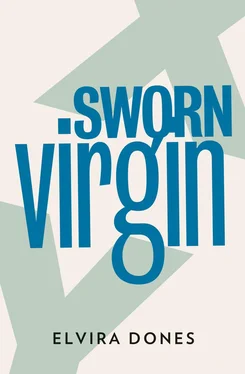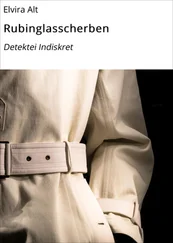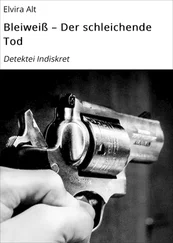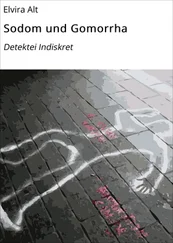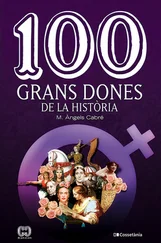The village doctor is transformed. Shaved and well dressed, he has even put on some cologne.
‘Strange things city people do,’ Aunt Katrina murmurs. ‘A man who wears perfume, ku ku moj nanë .’ 6
The doctor does everything he can. He talks to the doctors and nurses. He rushes from one place to another. He brings them byrekë pastries, he says you never know, there’s always hope.
Hana went to the student-affairs office at the Liberal Arts Faculty and told them about her problem. She would have to miss a couple more days’ classes; she just needed to take her father to see a few more doctors. Her parents were not familiar with Tirana and would not be able to cope without her.
‘In your file it says your parents died when you were ten,’ the secretary objected.
‘The man who is sick raised me as his own daughter, so he is my father.’
‘If you say so,’ the woman muttered distrustfully.
Hana stared at her. She looked like a mole: brightly colored hair that failed to lighten her washed-out features, a rodent’s jaw, foreign clothes. Rumor had it that her long-dead husband had been a diplomat. Hana had been warned by her classmates to watch out for this secretary. If she took against you it was bad news. She was a Party member and sometimes even raised her voice with Faculty members.
‘He’s my father,’ Hana insisted, as she left the office.
‘Two days. You have two days’ official absence and that’s it,’ the woman shouted after her.
The soldiers on the other side of the wall are marching. Aunt Katrina came down to the city wearing national dress. They’re the best clothes she has. Decked out like this, she looks unreal.
Here in the city she seems less shy, she sits close to her husband and is not ashamed to touch him in public. Every now and then she lets out little shrieks of curiosity, breaking the silence. Uncle Gjergj is not unhappy to see his wife smiling.
‘How do you not get lost here all alone, my love?’ Katrina asks her over and over. ‘All these people.’
Hana laughs. She holds Uncle Gjergj’s hand tight. He looks so handsome today he could be in a Marubi portrait. 7There are no signs of the disease on his face. Around his neck there is a red scarf, and he is wearing his dark-blue suit with a white shirt and a qeleshe on his head. He doesn’t cough, he’s not in pain, he doesn’t ask any questions. He basks in the sun and lets Hana hold his hand.
Later, the doctors examine him, exchanging perplexed glances.
‘We must operate,’ they say. ‘There’s no time to waste.’
They take Hana into another room.
‘Are you over eighteen?’ one of them asks her.
‘I’m a freshman here at the university. I just turned nineteen.’
‘And you don’t have any brothers or sisters?’
‘No, it’s just me.’
‘What’s your name?’
‘Hana.’
‘Listen, Hëna—’
‘It’s Hana, not Hëna.’
She loved her name. She loved the soft sound of the ‘a’ in the middle. Here in the south the vowel was more closed: Hëna.
‘Hana sunshine,’ her mother used to call her. She remembered her mother years back, when Hana was a little girl. She used to sing. If her mother hadn’t been born in the mountains she would have been a singer.
Hana sunshine.
‘You need to make a decision, young lady,’ persisted the doctor who seemed to be the most senior. ‘The sooner we perform surgery on your uncle, the better.’
‘He’s my father. Is there hope, Comrade Doctor?’
‘We don’t know yet.’
‘Will he be in a lot of pain?’
‘He’ll be in more if he doesn’t have the operation.’
‘But there is hope; there must be hope!’
The doctors look at each other.
‘There are no guarantees. But we’ll do what we can. If we manage to remove the whole tumor he could make it.’
‘Did you tell him there was a chance? The doctors in Scutari said there was no hope, and now he’s convinced it’s true.’
‘Up there they don’t know how to perform such a delicate operation.’
‘What are our chances, Comrade Doctor?’
‘Maybe thirty percent. Even if we can’t eradicate the tumor, he’ll still live longer.’
‘How much longer?’
‘Up to a year, maybe. Or more. Or less. Go and talk to your uncle. He doesn’t want the surgery. You have to persuade him.’
‘He’s my father. I told you, he’s my father.’
The hotel Hana has found for Gjergj and Katrina is modest but clean. The restaurant only serves rice and spinach.
‘I thought it was only us up in the north who were poor,’ Uncle Gjergj comments. ‘But it looks like people in the city are not doing much better.’
He eats with gusto, even though it’s painful to swallow. The waiter’s uniform is crumpled. He doesn’t show them much respect because he’s heard their northern accents, but none of them minds. Katrina can’t accept the fact that somebody is serving her at the table.
‘Relax, Auntie, this is what they do here. It’s a restaurant.’
‘I’m so ashamed. Sitting here and being served by a man! What is the world coming to?’
‘But he’s a waiter. That is what he’s paid to do.’
Their room is on the third floor. Hana is going to the college dorm for the night. In the morning she’ll get up early so none of her roommates can ask her any questions.
As soon as they get to their room, Katrina falls asleep. Her heart has not behaved very well today. Before leaving the hospital, the village doctor gave her some pills.
Hana and Gjergj stand out on the narrow balcony. He smokes. Down on the street, people are taking their traditional evening stroll; nobody wants to go home.
‘Why do you want to make me have this surgery, dear daughter?’ Uncle Gjergj asks. ‘You know there’s no point.’
‘The doctors say there’s hope.’
‘They’re just experimenting on me, Hana. You’re an adult now. You’ll soon be a woman who knows about life. I’ve had my share in this lifetime. What’s the point in my hanging on any longer?’
This must be the tenth time they’ve talked it over. His strength is leaving him. She can hear it in his voice, she can feel it in his hunched shoulders, however much effort he puts into standing up straight.
‘Do it for me, Uncle Gjergj. Let them do the surgery for me.’
‘I am doing all this for you. I don’t want to make you or Katrina suffer.’
‘What I’m saying is I want you to give it a try. Maybe the doctors will open you up and find it’s not as serious as they’re all saying it is.’
‘I feel there’s nothing to be done, Hana.’
‘I beg you,’ she says, melting into tears. ‘Have the surgery. I’ve never begged you before.’
Gjergj says nothing for a long time.
‘Just let me go,’ he pleads, in the end.
Under the balcony a military truck goes by. The soldiers are sitting in two silent rows. The streetlights tint their faces sepia.
‘What about Auntie? Don’t you care about her?’ Hana says, trying one last tack.
‘Of course I care about her. We have talked, Katrina and I.’
‘And?’
‘She wants me to have the surgery too.’
‘You see? How can you give up? You’ve never balked at anything.’
‘What do you know, little girl?’ Gjergj mumbles, his smile twisted. ‘I certainly have! Many a time … but there are so many things you don’t know. Our mountains under the communists … I’m not the man you think I am.’
What she’s saying is heartless, she thinks. What they are saying, what she’s asking him to do, this whole sea of words, it’s all heartless.
‘Just do it for me,’ she tries one last time. ‘I’m begging you on my knees. You’ve had a bullet stuck in your body for forty years and you’ve never complained. What’s a scalpel to you?’
Читать дальше
